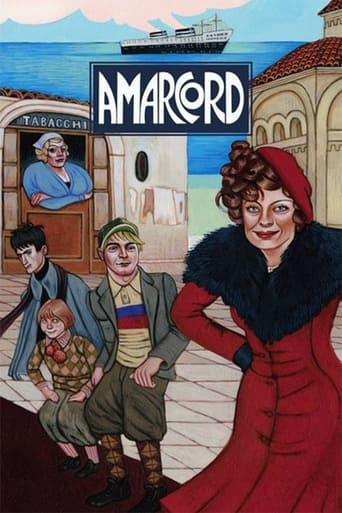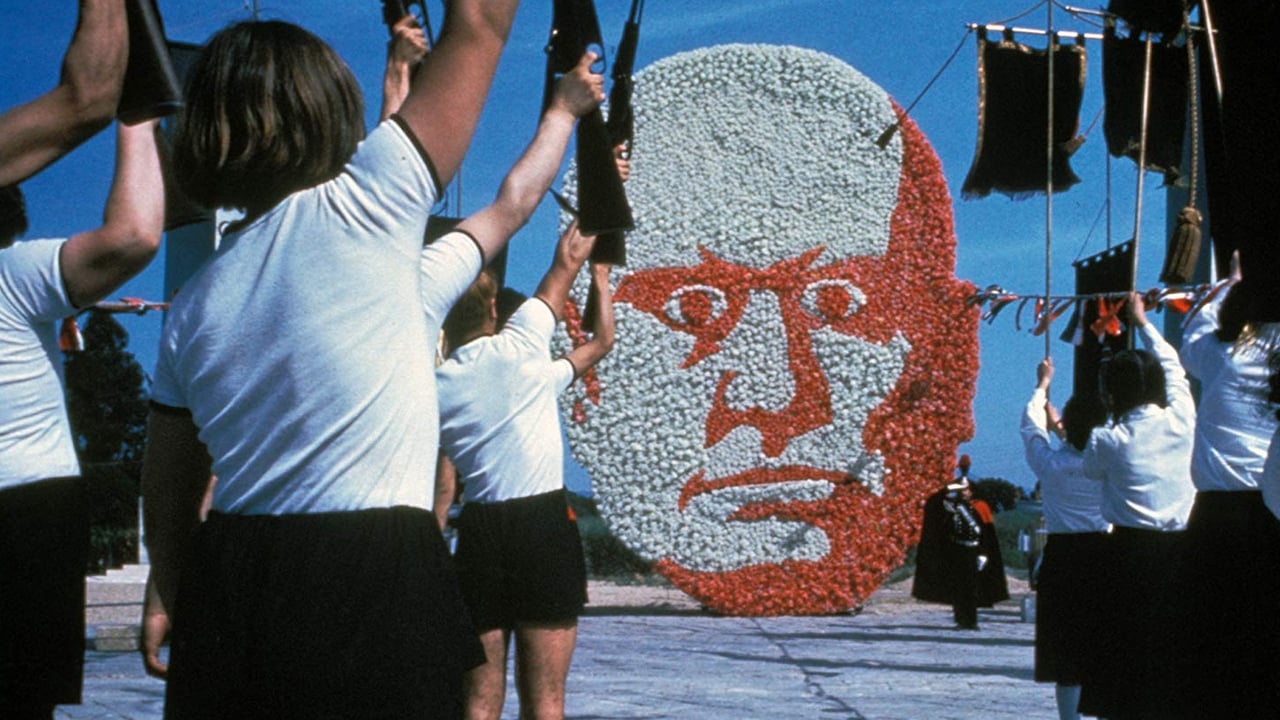SnoopyStyle
It's 1930s Fascist Italy. The movie follows the odd quirky villagers of a seaside town. The fascist local government takes control of the eager villagers with comical ridiculousness. The village is obsessed with sex which the Catholic Church tries to suppress.There are some great memorable characters and memorable scenes. The one missing thing is a good compelling lead character. Titta needs to have more scenes as the lead and he needs to be played by a charismatic actor. The vignettes start to get scattered without that central cohesive glue. Some are more surreal than other. The harem in the hotel goes a bit over the top. Otherwise I really like the quirkiness.
mario_c
Depicting what happens in an Italian little village in the middle 30's, Federico Fellini's AMARCORD is, at the same time, a sweet remembrance and a sarcastic and humorous satire. In fact this film describes very well the desires and irreverence of the youth (and probably here Fellini is depicting himself, when he was a young teenager) but it also portrays some social problems, the raise of Fascism in Italy and the difficulties of dysfunctional families. All of this with intense sarcasm and hilarious moments! The flatulence scenes for instance, can be disgusting to some, but I found them funny! I think there isn't a real main character in this film, because there're a few important to the plot. Of course the entire plot circles around TITTA (Bruno Zanin), but characters like MIRANDA or AURELIO, his parents, or even GRADISCA, his muse, are very important as well.Here Fellini does a film which is pure, intense, sarcastic, at parts grotesque, but essentially humorous and real! I score it 8/10!
felixoteiza
I remember having seen Amacord in the late 1970s; and also that its last scene left a sad feeling in me, despite having had good fun watching the rest and more than a few laughs in some of the most outrageous scenes: the antics of teachers and students in the classroom, the hilarious shenanigans at the family table, the day out in the countryside, etc. If I had at the time to resume the whole movie in one word I would have said: Nostalgia. What perhaps gives a good hint of how the world has changed, or maybe me, is that after this present day viewing I would have said two different words: Sadness, Melancholy. Amacord is such a melancholic film, it made me feel sorry for Fellini, for the things he had to endure during those early years of his life. I didn't notice at the time how sad is to have to grow up in a political system that doesn't allow the smallest form of dissent and which, even worse, has managed to entirely wrap up the lives of everyone in society and made of them contented, brainless, drones. How sad to have had, in that crucially formative period of our life nothing but unfunny clowns as our role models: the patriarch who nobody takes seriously and who in utter frustration tries to commit suicide tearing apart his own jaws; a poor sap whose isolated act of rebellion backfires and ends up in a literal stinko. The priest more preoccupied with church flower arrangements than with the confession of his young faithful. The parasitic uncle who pays his brother in law for providing him with free room and board by denouncing him to the fascist police. The gramps who rather than to dispense wise, time tested, advice to his grandchildren prefer to spend his time grabbing the maid, farting and reminiscing about "the old in and out", as Alex Lelarge would put it. A gallery of characters that, if you look behind the antics, the laugh, are throughly pathetic. Growing amongst them must have been quite an ordeal for poor young Federico.Of course some will have a different view on things, taking what Fellini himself postulated about the artist and reality "What is reality, who cares about reality?" He snaps back, answering to his interviewer, when confronted with the idea that any artwork is the fruit of the artist's take on reality. Not so, he says. The artist's work is not the reflection of reality in his mind, soul, but an entirely new construct by him. The artist creates his own reality says Fellini, and because of that he, Fellini, defines himself as a lier, but a honest one. So, we are not here to see his reminiscences of his younger years but to see the construct of his own imagination, using as basic bricks for it his own experiences, or those of others. Some of what we see in Amacord really happened, in the same way or not, and some of it is just his imagination. But we are not here to decode fiction from reality--must be our conclusion—but to watch what he has prepared for us. Sorry but that doesn't change the bare historical facts. Titta, Fellini's best friend, speaks of his complete indifference to the then prevailing political system and, given the faithful reproduction of the social conditions at the time in the film, we can only assume that what lay behind such indifference was nothing but a complete impotence and powerlessness face to the reigning situation as Titta's father, in the movie, shows us well where any demonstration of protest or revolt could have led the protester.One point well made by the DVD commentators concerns the subservient role played by women in Fellini's movies. Real communication, intimacy, between the sexes is practically absent, at least in this one, and women usually appear there to fulfill men's fantasies—to offer them their over-sized backsides and breasts for appreciation, for ex.--to clean after them or to take whatever blame is for the taking. Examples on this abound and I mention it because it's something I noticed also. The film begins, in fact, with the public burning of the "winter witch"(!)--with no Spring Fairy in sight. Then a good deal of movie time is spent showing males of all ages salivating at the sight of female body parts--which makes for a rather eerie analogy with a butcher's view of things--and ends up with the saddest vignette of all: Gradisca, the only truly liberated woman in town, marrying...a Mussolini carabiniere. A bird free as the wind willingly getting into a steel cage, everything coming into order... But anyway, this is a masterly made piece of cinematography. The color compositions are truly breathtaking, specially during the surreal late afternoon scene where the mad uncle is ordered down the tree by a midget nun. Also kudos for the night passage of the Rex and the foggy morning. Other scenes that deserve applause are the school kids dancing to the film's score outside the Grand Hotel, the bum playing the flute to the harem, the Mussolini parade and the recurrent guy in the motorcycle—I wish Gradisca had married him instead. The pacing is sustained and the camera work appropriate, without being what draws the most attention--that's ostensibly the colors. The acting, well, these people don't even seem to be acting, they are just being themselves, as in any typical Fellini. As for plot, there's no one here, just a composition of miscellaneous anecdotes intended to create a mood in the viewer, presumably of nostalgia...or sadness maybe. In all, a great Fellini, if not the most joyful or the deepest. 7.5/10.
Armand
I am not one of Fellini fans. his colors are to power, his style - not very seductive. a world of forever carnival, grotesque silhouettes, a creepy universe, after promising first part of work. but Amarcord is different. it is a testimony. not of its director early years but testimony of a society, small, childish, cruel. a town. and its people. desires, politic, humor,fake adventures,a teenager and an advocate as guides in the womb of facts and impressions.a film about basic things. with nostalgic flavor of past, with aura of a lost age. it is a Fellini. but, in same measure, it is more.a kind of song from ambiguous land. or only reflection of a trip in the secret parts of past.



 AD
AD



